Steve Gerber: An Absurd Journey Part I
By Darren Schroeder
It is hard to come up with an adequate introduction for a creator
who has had such an important impact on the comics scene. With
ground breaking work on such titles as Man-Thing,
Howard the Duck, Void Indigo and Nevada, he
has constantly shown that comics can tell a wide range of
stories, from dramatic to absurd to funny to shocking, and he has
never been afraid to try something new. While doing this Steve
Gerber doesn't insult the reader's intelligence and continues to
produce work that stands up to repeated reading. His answers to
my questions are a case in point.
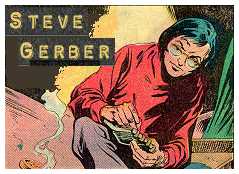 Darren Schroeder:
What is your full name?
Darren Schroeder:
What is your full name?
Steve Gerber: Stephen Ross Gerber.
DS: Age?
SRG: 53.
DS: Favourite web site?
SRG: Probably CNet's Download.com. I'm a software
geek..
DS: Were comics a big part of your childhood or did you
discover them at a later stage?
SRG: I probably discovered them when I was five or six
years old.
The first comic I clearly remember reading was an early '50s
issue of Batman, some story about a gang of crooks with a
car that could alter its shape and color to elude the police. I
remember, too, seeing at least a couple of issues of the original
Captain Marvel and Plastic Man before they ceased
publication in '53 or '54. My first sustained exposure to comics,
though, would have come as a result of the old Superman TV
series, which began airing in '53, when I was six. Once I found
out that the character also appeared in comics, my fate was
pretty much sealed.
As a kid I read just about any comic book I could get my hands
on, except for the romance, war, and western comics. My favorites
were Superman, Batman, and Uncle Scrooge.
Now that I think about it, even before I could read, I was
curious about the newspaper comics. My father used to read
Prince Valiant to me every Sunday.
DS: What story (comic/book/film or TV) had the biggest
effect on your later life and why?
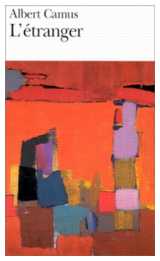 SRG: A
single story? I suppose that would be Albert Camus's
The Stranger, which I encountered my first or second year
of college. This will sound appallingly narcissistic, but that
book explained me to myself, in a way that nothing I'd ever read
had done before. It was my introduction to existentialism, and, in a
sense, it was directly responsible for the creation of Howard
the Duck. (As I type this, I can hear the distant whirr of
Camus spinning in his grave.)
SRG: A
single story? I suppose that would be Albert Camus's
The Stranger, which I encountered my first or second year
of college. This will sound appallingly narcissistic, but that
book explained me to myself, in a way that nothing I'd ever read
had done before. It was my introduction to existentialism, and, in a
sense, it was directly responsible for the creation of Howard
the Duck. (As I type this, I can hear the distant whirr of
Camus spinning in his grave.)
DS: In what way did it lead to Howard the Duck.
SRG: It relates directly to that sense of alienation I
mentioned. Howard is Mersault with a sense of humor, an
existentialist who screams and quacks as a hedge against sinking
into utter despair. The very first line that ever came out of his
beak, back in Fear #19, had to do with the absurdity of
existence. (The line was: Aw, Clam up, Bud! You don't even
know the meaning of the word! Finding yourself in a world
of talking hairless apes -- Now that's
absurdity!) I wasn't thinking about any of this consciously
at the time I created him, but it's all there.
DS: Can you describe what The Stranger, or the
Outsider as my translation named it, explained about
yourself? In it Meursault, the protagonist, seemed the direct
antithesis of your approach to writing "&Thinking of all the
characters, major or minor, as real people, and writing them that
way, as if they mattered in their own lives."
He, on the other hand, doesn't seem to think that other people
matter in their own life at all, and seemed to find no pleasure
in their or even his own life.
SRG: L'Etranger can be translated either way. Mersault is
an outsider, but he's also a stranger to everyone around him, and
to himself.
In any case, I didn't say I was Mersault. For most of my life,
though, I've shared some of his sense of alienation, of distance
from other people. I seriously doubt that Camus was Mersault,
either, or he'd never have been able to write about him. Mersault
would only have been capable of writing about himself.
DS: What comics have you read recently? Why did you
like/dislike them?
SRG: To be honest, I don't read many comics anymore. I
enjoy Warren Ellis and Darick Robertson's
Transmetropolitan. I've read a little of Brian Woods's
Channel Zero graphic novel and found it interesting (I do
intend to finish it at some point). And I've been reading the DC
archive editions of the old All-Star Comics as they've
been released.
The All-Star material, like most of the Golden Age stuff, is
interesting to me as history and as a link to the primal essence
of comics. A lot of it wasn't very well written or well drawn,
but it has a raw simplicity, a directness to it that's very
engaging, if sometimes painfully naive.
What I like about both Transmetropolitan and Channel
Zero is pretty basic: they're actually about something. In
those books, the creators are dealing with ideas and -- in the
case of Transmetropolitan.; I haven't read enough of
Channel Zero to be certain yet -- with characters who are
more than just empty icons.
DS:I found the first couple of issues of Channel
Zero entertaining in both storyline and Wood's graphic style,
but when I read the graphic novel collection I was disappointed
because he didn't really do much more than dilute the interesting
ideas in the later issues.
SRG: I couldn't comment one way or the other. All I've
seen is the first graphic novel collection.
DS: Why don't you read many comics anymore?
SRG: The short answer, I guess, is that I just don't enjoy
them very much.
The long answer is a little more complicated, and, to be honest,
I haven't sorted it all out yet. Part of it is that I just don't
find myself in comic book stores more than a few times a year and
don't feel any compelling need to make special trips. When I want
something to read, I go to Borders or Barnes & Noble if I'm in
the mood to browse, or Amazon.com if I'm not. Here and
there, I have bought a few comics -- non-superhero stuff, graphic
novels and such -- that I was predisposed to like, but somehow I
find I never get around to reading them. Maybe, to a certain
degree, I've lost my affection for the form itself. I'm not
sure.
DS: Is that because the form lacks something, the stories
people are telling aren't interesting or that your personal
experience in the business has colored your view of comics?
SRG: I hope it's not bitterness. I don't think it
is.
Part of it, I suspect, is that I really dislike the look of the
books these days. I'm not crazy about the manga-influenced art
styles, and the computer coloring leaves me completely cold --
the heavy modeling on all the figures, the lack of variation in
intensity between foreground and background. When you look at a
page of this stuff, your eye has no idea where to go. There's no
way to distinguish what's important in a panel. As I was saying
to someone the other day, now that all the colorists finally know
how to use computers, it would be nice if someone taught them how
to use color. I can think of very few who wouldn't profit greatly
from a week of instruction by Lynn Varley.
DS: What has been the most important change in the comic
industry over the period of your involvement with it?
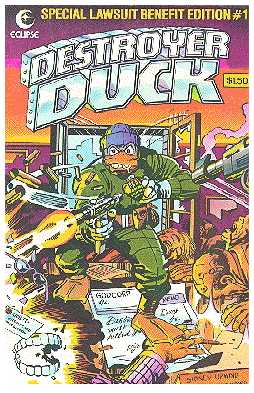 SRG: You know, my
first impulse was to answer this question with a laundry list,
but I got tripped up by that word "important." If you take that
word seriously enough, there really haven't been any important
changes in the industry, except, of course, for the fact that the
industry itself is now facing extinction. Creators' rights?
Creator royalties? The overall better treatment of writers and
artists? Sure, those seemed important -- but only briefly. In a
market that's incapable of selling anything other than
company-owned superheroes in any significant quantity, what do
they really mean?
SRG: You know, my
first impulse was to answer this question with a laundry list,
but I got tripped up by that word "important." If you take that
word seriously enough, there really haven't been any important
changes in the industry, except, of course, for the fact that the
industry itself is now facing extinction. Creators' rights?
Creator royalties? The overall better treatment of writers and
artists? Sure, those seemed important -- but only briefly. In a
market that's incapable of selling anything other than
company-owned superheroes in any significant quantity, what do
they really mean?
The perception of comics as art, as a medium for conveying ideas,
as a legitimate arm of popular culture? Also important, for a
time. But the industry -- and I mean the whole industry,
including the majority of creators -- has recoiled from the
implications of that perception, as if it were a poisonous snake.
Readers and retailers have, in the main, opted for stupid, empty
comics, and the industry has been cheerfully churning them out
for a diminishing audience, rather than attempting to infiltrate
the larger culture.
The direct sales market? Yes, that's been important, too -- in
the sense that hemlock was important to Socrates. Distribution on
a non-returnable basis has ultimately had the effect of inducing
a fatal complacency in the publishers and creators. As Steven
Grant put it in a recent column on theComic
Book Resources site, we used to buy comics because comics
could show us things we couldn't see anywhere else -- Weaponers
of Qward, Reverse-Flashes, Iron Men on roller skates. Today,
comics are still showing readers things they couldn't see
anywhere else in 1963. The world has changed; comics haven't. At
the most basic level of theme and plot, there's very little
difference between those old issues of All-Star and the
current issue of whatever superhero comic you'd care to name.
There's plenty of difference in the execution, though. The
stories, the art, even the characters themselves have become
exercises in self-congratulatory bombast. Everything screams,
"Lookit me-me-me-me-me-me!" The art is designed as self-promotion
for the artist and for later sale at conventions. The stories
read like sad little pleas for fan approval. And, perhaps most
tellingly, the characters refer to themselves as "heroes," and
not with any sense of irony, as, say, Spider-Man used to. It all
strikes me as a gigantic, somewhat ugly display of ego.
Gee. Went off on a little rant there, didn't I?
DS: Excellent, I'll take a rant over a yes/no answer every
time. Keep it up! What steps could/should be taken to save the
industry from the threat of extinction.
SRG: The same ones I've been advocating for about twenty
years. Abandon the 32-page monthly for more commercial magazine
and book formats. Publish a variety of content. Distribute beyond
the bounds of the specialty stores. Some of these steps are being
taken, finally, but at this point it may be too late to save
comics as an "industry." The form will never go away completely,
but we may see a drastic reduction in the amount of content
created for it. The next few years will tell the tale.
DS:Did the "serious" superhero tales that everyone name
checks when talking about comics these days offer a solution to
this or were they just part of the problem?
SRG: I'm not sure which stories you mean. The last
"serious" superhero stories I can think of are Watchmen
and Dark Knight. Nothing in the superhero genre since then
has been very important at all.
DS: Those are the stories I meant. Does your use of the
term important mean that you think these stories are of a high
standard?
SRG: More than that. Those books advanced the form -- of
comics, not just superheroes -- very profoundly. You can judge
their importance by their influence. Other writers and artists
were using those series, albeit not very successfully, as a
template, for a decade or more after they were published. Almost
every development since then has been more in the nature of a
fad: the "Image look," the bad girls, the "fun again" comics, the
nostalgia binge, and so on.
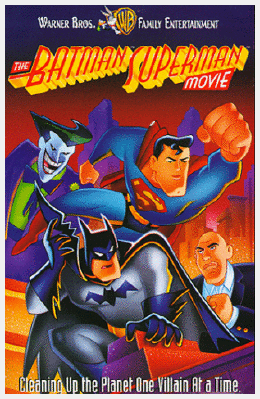 DS: Sometimes
the fads can have good effects. The "nostalgia binge" produced
the Batman Animated series and comics, which struck me as
quality entertainment put together by people who had some
affection for the characters. Is my impression supported by your
experience on the Superman and Batman animated
series?
DS: Sometimes
the fads can have good effects. The "nostalgia binge" produced
the Batman Animated series and comics, which struck me as
quality entertainment put together by people who had some
affection for the characters. Is my impression supported by your
experience on the Superman and Batman animated
series?
SRG: The success of the Batman movie was
responsible for the animated series, not any fad going on in
comics.
You're right about the people who worked on that show, and on
Superman. Alan Burnett, Paul Dini, and Bruce Timm all took
the characters very seriously, and that's evident in the design,
the animation, and the scripts. Along with G.I. Joe, I
think the Batman and Superman animated series are probably
the smartest adventure stuff ever done for American TV animation.
(G.I. Joe wasn't nearly as strong visually, of
course.)
DS: You have said elsewhere that you left a job in
advertising to enter the comics industry. Looking back, was that
a good move?
SRG: It's a little too late to regret that decision. I had
to leave advertising, but looking back, I suppose it might have
made more sense to have gone into film or TV, or to have tried
writing novels.
DS: How do you think your early work holds up on
re-reading it now?
SRG: It varies from series to series. Howard the
Duck holds up astonishingly well, despite some dated cultural
references. The last time I looked at my old Defenders
stuff was a number of years ago -- okay, more like a decade --
but as I remember, a lot of those stories hold up nicely, too.
Man-Thing is a mixed bag. Some of those stories still
work, some don't. And then there are things like my run on
Sub-Mariner that probably should never have seen the light
of day in the first place.
DS: Adrian Snowden
commented in the Slings and Arrows Comic Guide that you
"...infuse[d] personality into the supporting characters" in your
work in Adventure into Fear and the Man-Thing
titles. Do you think he has a point, and if so how did you
achieve that?
SRG: In Man-Thing it was absolutely necessary,
since the title character literally had no personality. That's
really a quality that runs through all my work, though, and I
doubt it was ever a conscious decision. I "achieved" it, if
that's the right word, by thinking of all the characters, major
or minor, as real people, and writing them that way, as if they
mattered in their own lives.
DS: Adventure into Fear #16 is a comic that I read
as a young child and the impression it made then has stuck with
me since. Are its themes of indigenous rights and environmental
concerns ones that still concern you now?
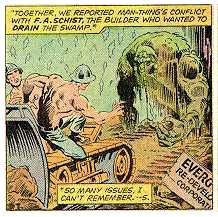 SRG: I have to
confess, I don't recall which story this was. (After almost
thirty years (gah!), matching up issue numbers with individual
stories gets difficult.) Could you refresh my memory a bit,
please?
SRG: I have to
confess, I don't recall which story this was. (After almost
thirty years (gah!), matching up issue numbers with individual
stories gets difficult.) Could you refresh my memory a bit,
please?
Meanwhile, I'll see if I can find the issue itself in my
"archives." (i.e., the boxes in my office closet.)
DS: Sure thing. Found my box of Man-Thing comics (plus
Void Indigo). Fear # 16, Sept. 1973 was called
Cry of the Native. It concerned the construction of an
airport in the swamp, and the efforts of the local Indians and
other concerned citizens to halt the excavation of the land.
Man-thing watches and is drawn into events, rescuing a wounded
Indian activist and causing the death of one of the construction
workers.
SRG: The environment, yes -- more now than ever. We've
made a pretty colossal mess of it in the twenty-odd years since
that story was published. Global warming is upon us. The ozone
layer is rapidly being eaten away. The rain forests are being
hacked to death. We're sinking in a morass of physical and
cultural garbage. And here in the U.S., we've got a president who
wants to despoil one of the last pristine environments in the
country, the Alaskan wilderness, with oil drilling rigs. I admit
I'm less concerned with the rights of indigenous people at the
moment than I am with the continued existence of indigenous
terrestrial species -- man among them.
DS: At the end of your run of Man-Thing you wrote yourself
into the comic. This was well before the terms "self referential"
or "breaking the fourth wall" became common. Where did you get
the idea to do that from?
SRG: Nowhere in particular. It was just a silly
inspiration. I felt I had a close relationship with readers of
that book, and I wanted my farewell to feel a little more
personal than just a comment in the letters page.
DS: What did you think of Chris Claremont reusing the same
device at the end of his run on the second series of
Man-thing?
SRG: I'm not sure I ever read that story, but I do
remember seeing it somewhere, and rolling my eyes. All I can tell
you is, I wouldn't have done it twice.
DS: Does your appearance mean that Marvel comics owns the
rights to the character Steve Gerber?
SRG: I suppose so. With the paucity of new ideas coming
from Marvel these days, I wouldn't be surprised if they brought
him back in a new mutant book -- say, JEWBOY-X. His power
could be to induce paralyzing guilt in his opponents.
DS: The chilling "Elements of Terror" Man-thing series
that appeared in Marvel Comics Presents (1-12) had a very
contemporary storyline with senate inquires, drugs for arms deals
etc. Were you expressing some of your own concerns in that plot
or just telling a story?
SRG: A little of both. If I recall correctly, that was
done around the time of the Iran-contra scandal, which, when you
think about, had a more outrageous plot than most so-called
thrillers. For me, Oliver North was, and remains, one of the most
terrifying figures ever to emerge from American politics. Call me
naive, but I was dumbfounded when people started calling this
asshole an "American Hero", and the media jumped on board, just
because he looked good in his uniform. (Naturally, he's a
talk-show host now, and I don't recall there being any outrage
over his being pardoned.) At the same time, I wanted to do
a story that dealt in at least a marginally realistic way with
the kinds of people and settings -- official Washington, and so
on -- that you just don't see very often in a Marvel comic.
DS: What makes someone a hero for you?
SRG: A hero is a person who ignores or overcomes jeopardy
to him- or herself in order to aid someone else, with no
expectation of reward. So, for example, Superman isn't acting
heroically when he bursts through a wall into a gangster's lair
to save Lois Lane from a hail of bullets; he's just being a nice
guy. When he bursts through a wall to save Lois from a hail of
kryptonite-jacketed bullets, he's acting heroically.
By that definition, Oliver North doesn't even come close, at
least not for his part in the Iran-contra scandal. He's more on
the order of a frat house prankster. He even tried to hide his
tracks by shredding documents when it looked like he might get
caught.
DS: What debt do you think the characters Man-Thing and
Sludge owe to the figure of the Golem?
SRG: To be honest, I wasn't even familiar with the legend
of the Golem at the time I started working on Man-Thing. I
suspect, though, that the creators of the Golden Age character
called The Heap were very familiar with it, and Man-Thing,
Swamp Thing, and Sludge all owe their existence to that
character.
DS: When the editor of the Marvel Knights line, Stuart
Moore, was asked about what characters he would like to make use
of he mentioned Man-Thing. What advice would you offer the
writer who gets that assignment if it eventuates?
SRG: First and foremost, don't try to imitate what I did
with the series. Create an entirely new supporting cast -- hell,
I had two or three different supporting casts for the series that
I used in an informal rotation -- and start fresh. Beyond that,
my only suggestion would be to keep him in the swamp. The minute
you establish that he can stray from that locale at any time, you
turn him into just another monster: Swamp Thing, the Zombie, even
the Hulk. Keeping him bound to the swamp makes the book
much harder to write, but it also forces you to be much
more inventive.
DS: Have you ever drawn any comics and if so, what were
the results like?
SRG: God, no. I've never been able to draw.
DS: Which of the artists that you have worked with do most
wish you could draw like and why?
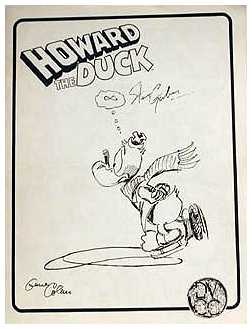 SRG: Wow. That's a question I've
never been
asked. I think the answer would have to be Gene Colan. I've
worked with more elaborate illustrators, like Craig Russell, and
more dynamic cartoonists, like Kirby, but Gene's style is not
only unique in comics, it also comes closest to the way I
visualize my own stories.
SRG: Wow. That's a question I've
never been
asked. I think the answer would have to be Gene Colan. I've
worked with more elaborate illustrators, like Craig Russell, and
more dynamic cartoonists, like Kirby, but Gene's style is not
only unique in comics, it also comes closest to the way I
visualize my own stories.
DS: Gene Colan has said in an interview
that he enjoyed working with you because you're a funny guy.
Prove it, tell us a joke.
SRG: A rabbi, a Druid, and leaf blower walk into a
bar...
DS: Nice one. Aside from drawing skills, what contribution
can an artist make to telling the story?
SRG: Stories in comics aren't, or shouldn't be, told just
in the writing. Pacing, flow, drama, humor -- all of those things
have to be conveyed in the pictures as well as the words. If the
art is "fighting" the story, or vice-versa, you get a very
unpleasant reading experience. I suppose the nearest analogy
might be something like ballet. The choreographer (the artist in
comics) doesn't write the music, but the way he or she moves the
dancers around on the stage fundamentally affects how the music
is heard and how the story is presented.
DS: What do you do when you see the final work and it
seems like the artist is tone deaf?
SRG: Groan a lot, mostly. By the time the final work is
in, there's not much else that can be done. If it's an ongoing
series, and I don't think there's any hope of communicating the
right tone to the artist, I might ask that another artist be
assigned to it.
DS: You worked on quite a number of Marvel comics during
the early seventies. Did you need to be well versed in the
detailed histories of all those characters or could you make it
up as you went along?
SRG: In those days, I knew the history backwards,
forwards, and six ways from Pluto. And I had a near-complete
collection of the Marvel books from 1961 on that I could use for
reference when necessary.
DS: What's the state of that collection now?
SRG: I try to avoid talking about this, because it gives
people heart failure. When I left New York in late 1976, I just
abandoned it. I was sick of lugging all those boxes around.
DS: Abandoned as in "sold for not much" or abandoned as in
"left on the side of the road"?
SRG: The latter. That's why it upsets people.
DS: Are comic really worth following taking into account
the cost of them and the practical problems that owning a comic
collection posses? I myself am a moderate to low buyer of comics
but even I've got about 30 boxes of comics that I have to find
room for in any flat I move into. I know that if I tried to sell
some of my collection no one will pay me what I had to shell out
for them so I am stuck with it.
SRG: Well, I've never been a "collector," as such. I've
always believed comics -- and books in general -- should be read,
not accumulated for their own sake. I have a limited amount of
space for books and for comics. When that space starts to fill, I
begin looking at what I really need, what I really want to keep,
and what I won't miss. The stuff in the third category gets
pitched.
The cost of comics -- the cover price, as opposed to the cost of
maintaining a collection -- is another question entirely. That
gets us into a whole discussion of the economics of the business.
I'm willing to talk about it, if you really want to. Mostly,
though, I'd just refer people to the first section of Scott
McCloud's Reinventing Comics. I don't agree with
everything Scott says -- particularly his limited definition of
"comics" and his vision of how to do them online -- but his
analysis of the business is pretty much dead-on.
Continued Part Two of Darren's interview
with Steve Gerber
When Steve's upcoming projects get announced (or to get them
announced) we will be doing a catch up interview on those and any
other topics that seem relevant. In the meantime you can keep up
to date with Steve's work via his website:
http://www.stevegerber.com
Internet Movie Data Base page for Steve
Steve's rejected script for HOWARD THE DUCK
Pitch for the unpublished Void Indigo issues
Steve talks about EXILES
Steve
talks about SLUDGE
ST:TNG Contagion.
Chronology of Star Trek Novelizations
Mention of a Batman episode called "Critters"?
howardtduck.homepage.com
FoolKiller
Great GI Joe Site.
Batman/Superman Animated
Interview with manwithoutfear.com
Power Questions Interview
Interview with Popimage.com
Westfield interview
Interview with Reading For Pleasure
Iguana Studios Contributes to Stanlee.net and 7th Portal Launch
Gene Colan chats with Kevin Hall
Gene Colan chats with Comic Book Resources
rec.arts.comics.misc FAQ Part 3: Inside the Comic Book Industry
